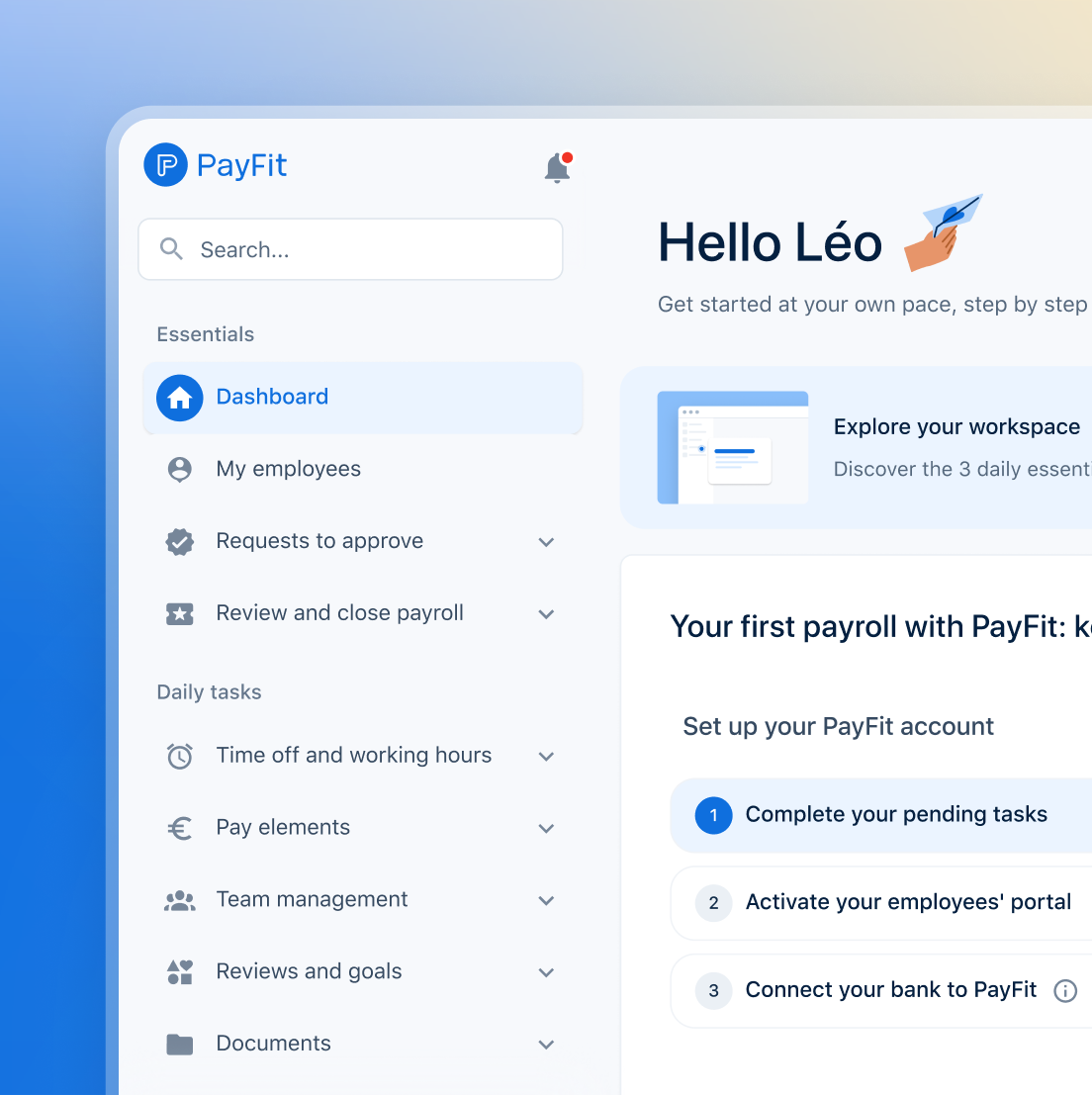✨ Health insurance, now in PayFit - learn more
💷 All the rates & thresholds you need to know for 25/26...right here
✨ The Payroll Journey: Start, Scale & Succeed Globally - learn more
✨ Health insurance, now in PayFit - learn more
💷 All the rates & thresholds you need to know for 25/26...right here
✨ The Payroll Journey: Start, Scale & Succeed Globally - learn more

The 2024 King’s Speech included several key announcements for businesses. Catch up on them all here.
It’s been a minute since we’ve covered a King’s Speech here on the PayFit blog. But with a new government firmly delivered by Labour’s landslide victory we thought it only just to produce a recap of the main announcements with implications for UK businesses.
There are a lot of changes coming up for businesses. The monarch took us through a package of almost 40 new bills that will target growing the economy, fixing planning laws and improving employment rights.
This last one is highly relevant for organisations across the UK, both large and small, and will significantly impact the work HR leaders and their teams do. Now, more than ever, it’s essential for businesses to stay on top of what the government announces and keep pace with changing compliance - but we have something handy that can help with that, which we’ll touch on later.
For now, here are the top changes that were announced during the 2024 King’s Speech.
Over the course of the monarch’s speech, four particular changes were announced which are likely to affect businesses.
In the UK, employment rights are determined by employment status. Broadly speaking, workers fall into one of three categories - they’re either an employee, worker or are self-employed.
Historically, employees have had many more rights and protections over workers, which is why the new government aims to introduce a single ‘worker’ status to better cover everyone.
It’s a solution policy-makers hope will be a win-win, affording employees more freedom to refuse unreasonable contract terms and conditions, while giving workers more certainty over their working hours as well as access to benefits like maternity and redundancy pay.
For HR specialists at small businesses, this could result in additional admin. It’s important for People teams to prepare early by assessing who might benefit from this transition among staff, particularly those on irregular hours or who might be self-employed.
The rise of ‘gig’ economy companies, such as transport and food delivery services, has meant that zero-hour contracts have become more prevalent.
For some workers, these arrangements have been a good thing - providing much needed flexibility to fit work around their lives.
But there are two issues at play - the contracts themselves but also the working arrangements that ensue.
That led to a proposal to ban zero-hour contracts altogether. However it seems much more likely now that the new government will simply outlaw what it’s termed as ‘exploitative’ zero-hour contracts - those that are very one-sided and which heavily benefit employers over employees
But there is further consultation to be had to determine how this might be rolled out. How will unexpected staff shortages be dealt with? Will there be changes to fixed-term contracts or seasonal work?
There are questions still to be answered. In the meantime, businesses both large and small should review how they’re using zero-hour contracts and whether they can make hours or scheduling more predictable for workers.
Many will agree that fire and rehire practices are both damaging to working relationships and a brand’s or business’s reputation.
The topic isn’t new, and was in fact worked on by the previous government who managed to draft an initial code of practice.
Now that the mantle has passed to Labour, we’re likely to see a new approach to ending the abuse of fire and rehire as well as fresh efforts to bolster existing codes of practice.
Already the government has signalled there will be more consultations carried out with businesses, unions and representatives. So, those businesses planning on restructuring may want to reflect on how these new changes might impact them.
Of all the changes announced during the 2024 King’s Speech, providing day one rights will perhaps present the most challenges for businesses.
For one, the operational impact will be significant. Entitlement to parental leave and sick pay from day one means HR specialists will need to work out statutory pay calculations straight away for new hires.
And the removal of the two-year eligibility period for unfair dismissal could lead to issues around how businesses handle poor performance in the first few months. Having an effective onboarding plan in place and as well as clear probation guidelines can help mitigate these issues and prevent disputes between employers and employees going to tribunal.
Payroll audit guide & checklist
In addition to the key changes previously mentioned, there are more legislation updates in the policy pipeline, they include:
A significant and positive step in the right direction of achieving stronger diversity & inclusion at work, this bill will play a key role in promoting further workplace equity. But HR leaders will need a sound understanding of how to gather data sensitively and accurately to support new initiatives. Employment contracts will need updating, pay gaps addressing, and line managers may require training on this new legislation to ensure full compliance.
Workers may also get the right to contracts revised to reflect the number of hours they regularly work, using the 12 week period as a reference. In addition to this, policymakers want to give workers reasonable notice for when their working hours change or suffer cancellations.
To prepare, businesses should review how their scheduling systems work, especially when it comes to workers turning up or ‘standing down’ at short notice.
Lawmakers are also keen to extend equal pay protections to cover race and disability. This means even more than before that businesses will need to dig into their pay gap data more deeply to understand what is driving pay discrepancies and take the right steps to address these.
The government is also committing to update trade union legislation to remove unnecessary restrictions on activities and simplify how statutory recognition is obtained. They will pave a better way for workers and union members to access unions within UK workplaces.
Finally, calls to review the Living Wage and National Minimum Wage are being heeded, and the new government plans to introduce a new ‘Genuine Living Wage’ for all adult workers with the intention of increasing take-home pay.
Of course, this will present challenges for businesses that are currently struggling to pay at or near the current Living Wage. More generally, businesses will need to keep on top of wage and rate announcements throughout the tax year.
If the prospect of staying on top of 40+ new bills and any related rate, threshold changes doesn’t sound appealing, you may want to check out PayFit.
We’re payroll software that stays on top of new payroll compliance, so you can rest easy knowing all those intricate legislation details are taken care of. Plus we automate over 90% of payroll tasks, including calculations, rate applications as well as HMRC and pension submissions.
Keen to find out more? Get to know PayFit, and what it could do for your business, by booking a one-to-one tailored demo with one of our friendly product experts.


Learn how to register for Payrolling Benefits in Kind (PBiK) & simplify HMRC reporting. Discover 2025/26 updates & prepare for mandatory payrolling in 2027.

We explore the proposal for a £1,600 monthly universal basic income (UBI) trial in England, considering all the pros, cons and payroll implications.

If you pay Class 1 National Insurance, you can qualify for what’s called the Employment Allowance, and a lower Employer NI bill. Find out how here.

The 2024 Autumn Budget has landed. What does the new Labour government have in store for businesses and their employees? We recap the top announcements made.

Read our guide to answer the question ‘what is small employers’ relief’, to find out how you can qualify as a business, and how much you can claim.

In this post, we’ll look at TUPE (Transfer of Undertakings Protection of Employment Rights), how it works and what employers need to know.

See what's new in PayFit
New features to save you time and give you back control. Watch now to see what's possible